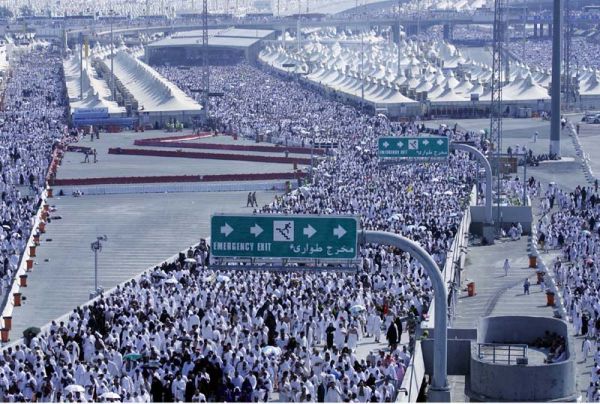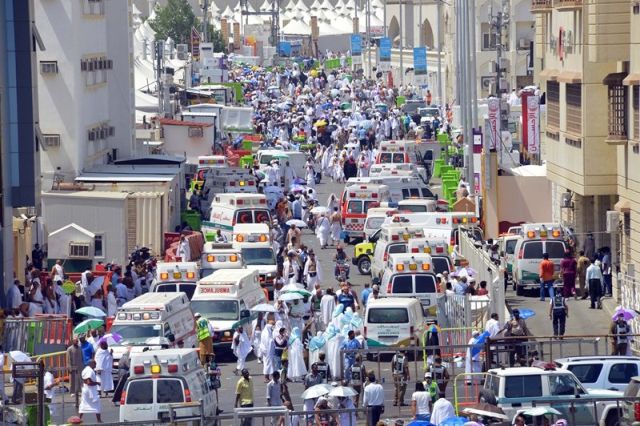
by Editor | May 25, 2021 | Muslim World
 Makkah : More than two million pilgrims began to leave Saudi Arabia after completing their pilgrimage, amid an integrated system of services set up by the Saudi government.
Makkah : More than two million pilgrims began to leave Saudi Arabia after completing their pilgrimage, amid an integrated system of services set up by the Saudi government.
Pilgrims continue to leave until the beginning of Muharram, which will see the departure of the last pilgrim from the country.
The Saudi government announced the success of Hajj this year, noting that pre-planned programs for the conduct of Hajj, both those related to guiding pilgrims and maintain their security and safety, helped in the massive success.
The government of Saudi Arabia had mobilized more than 100,000 security forces to ensure a safe and hassle-free Hajj. The government also announced that the Hajj season has been epidemic-free and that all pilgrims are healthy and well.
Medical services were provided to more than 465,000 pilgrims. More than 566 cardiac catheterizations, 28 open heart surgeries, and 1520 kidney dialysis were performed.
More than 400 bedridden pilgrims were transported to the holy sites to complete their rituals in a convoy equipped with all necessities.
The Saudi government has prepared 25 hospitals in Makkah, Madinah, and the holy sites. It also prepared 158 health centers with 31,000 health workers to deal with emergency cases.
Tawafa institutions started transporting pilgrims to Jeddah and Madinah according to their approved schedules.
In preparation to transport pilgrims to more than 100 international destinations, Saudi Airlines has set up a schedule of more than 2,300 flights for pilgrims.
The company is providing a service where pilgrims can check-in their luggage in advance so they can devote themselves for Hajj and avoid any delays or congestions at departure halls. It also allocated staff to work around the clock to facilitate pilgrims’ trips.
Pilgrims usually buy souvenirs to keep their memories of Hajj.
Deputy Sheikh of Jewelers of Makkah Abdul Ghani Al-Sayegh said that there is a decline of 20 percent in sales of gold among pilgrims.
He told the International Islamic News Agency (IINA) that this decline in sales is attributed to the steady rise in gold prices since August 17, in addition to the turbulent economic situation in many countries.
More than 2,300,000 people performed the pilgrimage this year, of which 1,752,000 came from outside Saudi Arabia.
Around 1,334,000 of pilgrims were males, compared to 1,018,000 females.
—AG/IINA

by Editor | May 25, 2021 | Muslim World
 Riyadh : Thirty-five Egyptian pilgrims died during the annual Haj pilgrimage in Saudi Arabia’s Mecca.
Riyadh : Thirty-five Egyptian pilgrims died during the annual Haj pilgrimage in Saudi Arabia’s Mecca.
The news was confirmed on Saturday by the head of Egypt’s Medical Haj Mission Ahmed el Ansary who said that the ages of the dead pilgrims varied between 60 and 85 years, reports Xinhua news agency.
The deaths were mainly due to stress and old age.
The pilgrimage started on August 31, with more than two million pilgrims, including 1.8 million foreigners, expected to participate.
Haj is the most important ritual among Muslims in the world. The pilgrimage will continue until next week.
On Friday, Saudi Arabian authorities tightened security banning over 400,000 illegal pilgrims from entering Mecca for not having Haj permits.
—IANS

by Editor | May 25, 2021 | Muslim World
 Makkah (Saudi Arabia) : Nearly two million Muslims from around the world have gathered here in an effort “to renew their sense of purpose in life, erase past sins and beg God for forgiveness and guidance” at the annual Haj pilgrimage.
Makkah (Saudi Arabia) : Nearly two million Muslims from around the world have gathered here in an effort “to renew their sense of purpose in life, erase past sins and beg God for forgiveness and guidance” at the annual Haj pilgrimage.
Around 1,70,000 Indians are on the Haj pilgrimage this year.
Saudi Arabia organises and conducts the pilgrimage, under the supervision of King Salman bin Abdulaziz and Crown Prince Mohammad bin Salman — the Custodians of the two holy mosques (Al-Masjid al-Haram in Mecca and Al-Masjid an-Nabawi in Medina).
“Hosting Haj each year is an honour and a great responsibility for the Kingdom of Saudi Arabia, one we hold dear to our hearts,” Saudi Minister of Culture and Information Awwad Alawwad said in a statement on Thursday.
“We spare no effort when it comes to the well-being of pilgrims and our number one priority is to welcome individuals from all over the world as they seek to fulfil their religious and spiritual duty,” he added.
Haj, the largest annual international gathering, is the Muslim pilgrimage to Makkah, which began on Wednesday. It will go on till September 4.
The rituals involved are intended to cleanse the soul and demonstrate the equality and solidarity of all Muslims, in their submission to God, said the statement.
In fact, along with the idea of successful organisation of Haj, Saudi Arabia is also seeking to position itself as a welcoming and inclusive destination for all Muslims to celebrate their faith and culture, according to the Culture Ministry’s statement.
It further said that the country plans to leverage Haj as an opportunity to position Islam as a united, tolerant and peaceful faith, so that pilgrims take a message of hope and unity back home.
—IANS

by Editor | May 25, 2021 | Muslim World
 Riyadh : Iranians and Qataris are among the more than 1.7 million Muslims gathered in the holy city of Mecca for the Hajj pilgrimage, even though the governments in Tehran and Doha are at odds with Saudi Arabia.
Riyadh : Iranians and Qataris are among the more than 1.7 million Muslims gathered in the holy city of Mecca for the Hajj pilgrimage, even though the governments in Tehran and Doha are at odds with Saudi Arabia.
Despite closing the border with Qatar on June 5 as part of the Gulf countries’ economic and diplomatic offensive against the gas-rich emirate, Saudi Arabia has allowed 1,340 Qataris to enter the country for the Hajj.
Doha earlier refused Riyadh’s proposal to arrange charter flights for Qatari pilgrims.
The Saudi minister of Islamic Affairs, Saleh al-Sheikh, told his country’s official news agency SPA that the kingdom serves all pilgrims without discrimination or exclusion on the basis of nationality, tribe or sect.
Political tensions are overshadowing the great religious event, but have not prevented 86,500 Iranian pilgrims from coming to Mecca this year after they were excluded last year following a deadly stampede during the 2015 Hajj.
Nearly 2,500 people – including 400 Iranians – died in the stampede, which Riyadh blamed on the Iranians, while Tehran faulted the Saudi government.
The Jeddah-based International Islamic News Agency said that the pilgrims include 25,500 people from the United Kingdom, 20,500 from Russia, 17,000 from the United States and 10,000 from France, among many other nationalities.
For the first time, the Saudi Ministry of Education has established nurseries where parents can leave their children while they perform the rituals of the pilgrimage, which lasts several days and takes place in different places.
Some 15,000 officers will ensure the safety of the Hajj and escort the pilgrims, according to the director of security, Gen. Mohamed al-Sharif.
The head of Saudi civil defense, Suleiman al-Amro, said that more than 3,000 “machines and devices” had been deployed in the holy places to respond to possible emergencies.
Besides the deadly stampede, the 2015 Hajj was also marred by a crane accident at the Great Mosque that left 100 people dead.
—IANS

by Editor | May 25, 2021 | Halal Food, Halal Industries, Muslim World
 Jeddah : Around 20,000 seasonal staffers from seven countries will be engaged in carrying out the Saudi Project for the Utilization of Sacrificial Meat (ADAHI) for this year’s Hajj.
Jeddah : Around 20,000 seasonal staffers from seven countries will be engaged in carrying out the Saudi Project for the Utilization of Sacrificial Meat (ADAHI) for this year’s Hajj.
Mousa Al-Akkasi, general supervisor of the project, said that heads of sacrificial animals, ranging between 750,000 and 900,000 are expected to be slaughtered under the project, being implemented by the Islamic Development Bank (IDB). He said that the seasonal staff includes veterinary doctors, Islamic jurists, butchers, technicians and workers from Egypt, Turkey, Jordan, Djibouti, Sudan, Lebanon and Morocco. Since commencing the project under IDB in 1403H, a total of more than 10.5 million heads of sacrificial animals have been slaughtered, of which 9.65 million distributed outside the Kingdom. This year, the poor and needy people from 27 countries will be benefitted from the sacrificial meat.
—HA/IINA

 Makkah : More than two million pilgrims began to leave Saudi Arabia after completing their pilgrimage, amid an integrated system of services set up by the Saudi government.
Makkah : More than two million pilgrims began to leave Saudi Arabia after completing their pilgrimage, amid an integrated system of services set up by the Saudi government.


